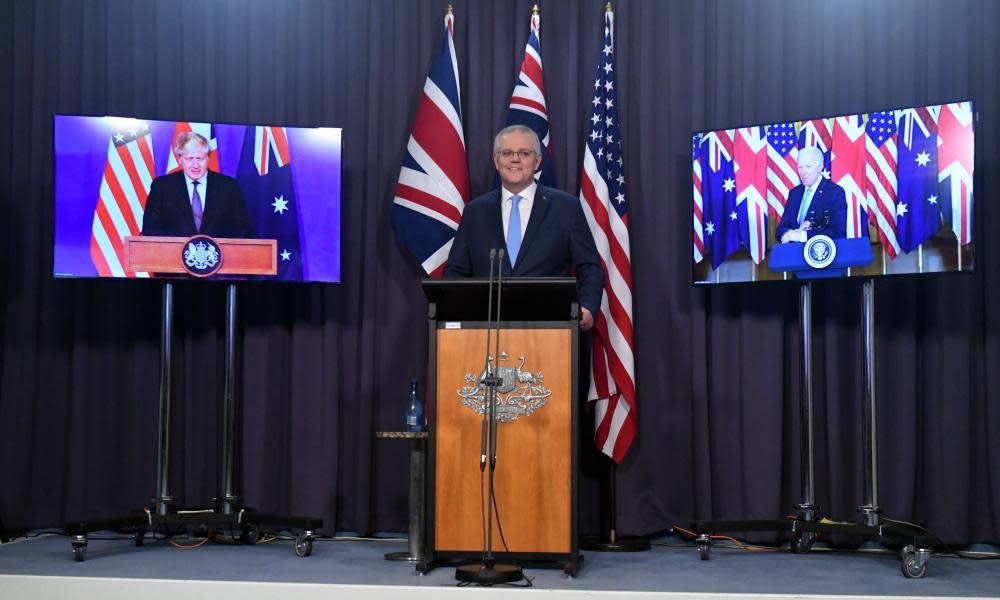Australia nuclear submarine deal: Aukus defence pact with US and UK means $90bn contract with France will be scrapped

Australia has scrapped its strife-torn $90bn submarine deal with France and entered a new pact with the United States and the United Kingdom to acquire nuclear-powered submarines.
Scott Morrison made the announcement early on Thursday in Canberra during a virtual address with Joe Biden and and Boris Johnson – a coordinated show of diplomatic strength clearly aimed at China, the rising power in the Indo-Pacific.
While some defence analysts have pushed for the development of nuclear-powered submarines in Australia for two decades, Australia does not have a domestic nuclear industry.
The prime minister told reporters: “We intend to build these submarines in Adelaide, Australia, in close cooperation with the United Kingdom and the United States.
Related: US, UK and Australia forge military alliance to counter China
“But let me be clear – Australia is not seeking to establish a nuclear industry or establish a civil nuclear capability, and we will continue to meet all of our nuclear non-proliferation obligations.”
Morrison said the preparations for the deal would take 18 months. Given the lack of local capability, Australia would need to “leverage expertise” from the US and the UK, “building on the two countries’ submarine programs to bring an Australian capability into service at the earliest achievable date”.
The prime minister said Australia was committed to “adhering to the highest standards for safeguards, transparency, verification, and accountancy measures to ensure the non-proliferation, safety, and security of nuclear material and technology”.
Labor was briefed on the new security pact on Wednesday. Historically, the opposition has opposed the development of nuclear power in Australia.
Morrison, Biden and Johnson were at pains on Thursday morning to say the submarines delivered under the security partnership would not carry nuclear weapons.
Referencing the capability gap, Johnson said the first task would be to “help” Australia acquire a fleet of nuclear-powered submarines, “emphasising, of course, that the submarines in question will be powered by nuclear reactors – not armed with nuclear weapons”.
Thursday’s announcement followed a meeting between Morrison, Biden and Johnson at the G7, and a separate meeting between Australia’s prime minister and the French president Emmanuel Macron in Paris.
Australia had planned to acquire 12 new Attack-class submarines under a $90bn program with France’s Naval Group, but Australia’s biggest defence acquisition has been plagued by delays, cost blowouts, and disputes over local industry involvement.
The first of the new French-designed submarines was expected to be operational in 2034, with each subsequent submarine delivered every two years.
These were intended to replace the fleet of six Collins class submarines, but officials have said it would not be until the early 2040s that the majority of Australia’s operational submarines would be Attack class.
Senior Biden administration officials said they would “let Australia answer questions about their arrangement with France for conventional submarines”, but acknowledged the new plans for nuclear-powered submarines would be “challenging”, and “the biggest strategic step that Australia has taken in generations”.
“I do want to just underscore that it’s very hard to overestimate how challenging and how important this endeavour will be,” a Biden administration official said at a briefing.
“Australia does not have a nuclear domestic infrastructure. They have made a major commitment to go in this direction. This will be a sustained effort over years. And everything that we’ve seen from Australia indicates that they’re determined to proceed on this course, and we have high confidence – complete confidence – that they will be effective in this pursuit.”
A push for greater involvement of Australian industry has been a key sticking point between the Australian government and France’s Naval Group.
In March the then acting defence minister, Marise Payne, said the government had renegotiated the strategic partnering agreement so the company was required to “spend at least 60% of the contract value in Australia over the life of the program”.
However, questions continued to be raised over the fine print of that deal.
Shortly after being appointed as defence minister, Peter Dutton refused to rule out tearing up the submarine contract – even though he said his focus would be on pursuing “greater performance than what we’ve seen previously”.
Some defence analysts predicted Dutton – who has been particularly forthright in raising public warnings about the security threat posed by China – would take a harder line on the big defence acquisitions and make some industry partners “uncomfortable”.
Email: sign up for our daily morning briefing newsletter
App: download the free app and never miss the biggest stories, or get our weekend edition for a curated selection of the week's best stories
Social: follow us on YouTube, Facebook, Instagram, Twitter or TikTok
Podcast: listen to our daily episodes on Apple Podcasts, Spotify or search "Full Story" in your favourite app
When Morrison met Macron in Paris in June, shortly after attending the G7 summit in the UK, he said he appreciated the French president was “taking a very active role” resolving issues with the contract, “but there is still a long way to go”.
In Paris, when asked whether the government might walk away from the contract in September if unhappy with the next version of the design work, Morrison said: “Contracts have gates and that’s the next gate.”
The bidding process for the future submarine project was set in train under the Abbott government, and it was the Turnbull government that announced in April 2016 that the submarines would be built in Adelaide with a French design.
The Australian National Audit Office has previously found the government “increased the risk of this acquisition” by pursuing this approach rather than buying submarines “off the shelf”.

 Yahoo News
Yahoo News 
